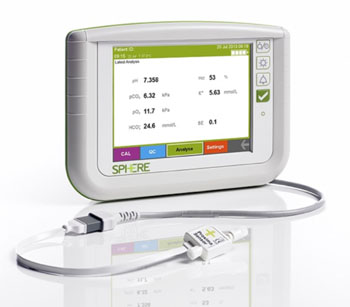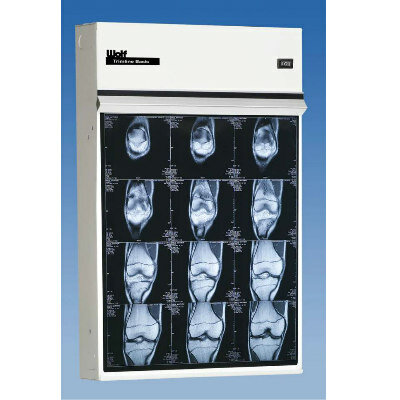In-Line Analyzer Monitors Blood Gases Bedside
By HospiMedica International staff writers
Posted on 26 Mar 2015
A novel miniaturized blood gas analyzer delivers true point-of-care testing (POCT), enabling fast response and proactive critical care. Posted on 26 Mar 2015
The Proxima system includes the miniature Proxima Sensor and a dedicated bedside monitor. The sensor is mounted in line with an arterial pressure monitoring line that incorporates a closed blood sampling device. When arterial blood gas analysis is required, blood is withdrawn from the patient into the Proxima, where it passes an array of biosensors on a silicon chip, each one a miniaturized version of electrochemical sensors used in a traditional blood gas analyzer. After passing the analyte panel, all blood is returned to the patient, promoting blood conservation and reducing the possibility of hospital acquired anemia and subsequent transfusions.

Image: The miniature Proxima Sensor and dedicated bedside monitor (Photo courtesy of Sphere Medical).
The disposable sensor can be used for monitoring blood gases and electrolytes (including pH, pCO2, pO2, hematocrit, and K+) over a 72 hour period for as many times as required, making it particularly useful in the management of specific conditions where a patient may be unstable, such as acute respiratory distress (ARDS), severe sepsis, trauma, and traumatic brain injury (TBI). The system is operated via a touch screen interface in the dedicated bedside monitor. The Proxima system is a product of Sphere Medical (Cambridge, United Kingdom).
“Frequent measurement of arterial blood samples is a key component in the effective management of patients in the critical care environment, particularly those that are unstable,” said Dr. Wolfgang Rencken, PhD, CEO of Sphere Medical. “For this reason we have developed and launched Proxima to keep the care giver by the patient, conserve blood, and rapidly return blood gas results to aid early decision making and closer control of therapy for critically ill patients – all of which will ultimately improve patient outcomes.”
“Rapid return of data and swift response to changing blood gases is as essential in patient care as the continual measurement of blood pressure,” said Tom Clutton-Brock, MD, senior lecturer of anesthesia and intensive care medicine at University Hospital Birmingham (United Kingdom), who led a recent clinical study of the system. “Fast feedback and response could have a real impact on efficiently stabilizing patients or weaning them from mechanical ventilation.”
Related Links:
Sphere Medical














